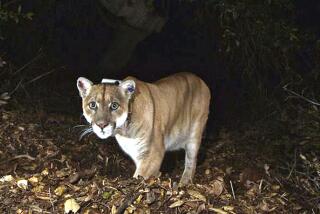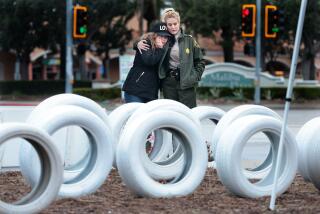On the Litter Trail : Groups Adopt Stretches of Highway to Keep Them Clean
NEWPORT BEACH — Is this the sort of behavior one would expect from a bunch of frat boys?
A couple of times a month, the gang at UC Irvine’s Pi Kappa Phi fraternity heads out to a rolling stretch of California 73 in Newport Beach to pick up bottles, newspapers, fast-food wrappers and other trash scattered along the highway.
No, this is not some sort of hazing ritual. The brothers of Pi Kappa Phi are one of more than 700 groups up and down California taking part in the state’s fledgling “adopt-a-highway” program.
Participants are typically assigned a two-mile stretch of highway, given white hard hats and bright orange vests, instructed on safety procedures, and then set loose to keep their adopted strip of asphalt litter-free. Each group gets a very tangible reward: Its name is emblazoned on a 7-by-4-foot sign posted along its little piece of freeway.
“Ultimately, we could be to the point where virtually every highway in the state is adopted,” said Ralph Carhart, statewide director of the program for the California Department of Transportation. “It’s actually a lot of fun. My own Rotary Club has adopted a highway and we get lobbyists and physicians out there picking up litter and joking about being mistaken for prisoners. They have a ball.”
The year-old program has drawn the usual assortment of clubs, Boy Scout troops and other service organizations. It has also attracted an eclectic mix of participants, including a gay and lesbian church in West Hollywood, a retired school principal who scours a 15-mile swath of California 330 outside rural Running Springs, off-road motorcycle clubs, and even a nudist group that has adopted a part of Interstate 15 in San Bernardino County.
Hollywood has also chipped in. Bo Derek has occasionally joined a group of fellow homeowners who keep a stretch of highway in Santa Ynez Valley clean. Actress Bette Midler has inquired about adopting a patch of pavement in Los Angeles, state officials said.
Eager for some good publicity or simply for a chance to do some good, businesses large and small have joined the effort, including real estate firms, car dealerships, law firms and a broad slate of McDonald’s restaurants.
“I do a lot of running, and when I run over trash that’s from McDonald’s, it bothers me a bit,” said Ross Pollard, who owns four of the restaurants in southern Orange County. “In my own little way, this makes me feel better.”
One group of entrepreneurs in Orange County has created its own Adopt-a-Highway Maintenance Corp. The company dispatches professional cleanup crews hired by dozens of clients to tackle the trash on congested freeways deemed too dangerous for the average klatch of volunteers.
The statewide highway cleanup effort has already proven to be more than a drop in the trash can.
Thus far, 1,200 miles of the state’s 15,000 miles of highway have been spoken for. So many groups have offered to pitch in that Caltrans has a backlog of orders for placards.
“It’s a lot of hard work, but it’s gratifying,” said Barbara Stovall, community improvement chairwoman at the Julian Woman’s Club, which cleans up 10 miles along two state highways leading into the hillside hamlet in San Diego County. “It shows that there are people in the community that do care, and I think that makes everyone feel good.”
Caltrans officials conservatively estimate that the effort is providing the state the equivalent of 100 full-time workers and saving about $2 million a year. The volunteers allow maintenance crews to spend more time mending guardrails and patching potholes than cleaning up after messy motorists.
Even the most avid promoters acknowledge that the adopt-a-highway program, which was launched in Texas five years ago and has spread to 40 states, has far to go before California’s highways can be declared free of trash. More than $25 million is still spent by Caltrans each year to pick up 4.4 billion pieces of trash--162 pieces per resident--that officials estimate are tossed onto streets and highways.
State officials remain convinced that their adoption plan can make a dent on the dumping grounds along highways, particularly along rural swaths.
Los Angeles and Ventura counties have 88 participants, while the Caltrans district covering San Diego County and the border region has about 90. Orange County, the state’s smallest Caltrans district, has about 20 groups working or waiting to adopt.
The Stockton office, which covers eight counties, has 120 in the fold, while the stretch between Santa Barbara and Monterey has more than 100 organizations participating.
“I think it’s bringing a lot of civic pride to a lot of little townships,” said Frank Lishey, coordinator of the program in San Bernardino and western Riverside counties.
Under the program, an organization or individual takes care of a two-mile segment for a two-year period. Some groups tackle a longer stretch. Each group must agree to clean the entire length at least four times a year.
The adopt-a-highway program has had a commendable safety record across the nation. No one has been killed or injured in California. Nationwide, the only death occurred in Texas.
The biggest controversy generated by the program anywhere has been in North Carolina, where a gay rights group sued the state when it refused to recognize the group in its program. The state also drew headlines in 1989 when it refused the Ku Klux Klan permission to adopt a road through a predominantly black neighborhood.
In California, there has been no such hubbub. The state prohibits political groups from participating in the program. The closest brush with that restriction has been a decision to allow Beyond War, an anti-military group, to take on a highway in the state’s far north forests.
The trash cleanup program has spawned other efforts. Caltrans recently initiated an adopt-a-wall program to clean gang graffiti marring freeways. In rural areas, the state has tried to woo groups interested in adopting drab parcels along the highway and planting them with native wildflowers and trees. About 100 acres have been sowed.
For some people, the highway cleanup routine is second nature. Doyle and Dorreh Dunham have always taken time to clean a mile-long stretch of road leading from their 10-acre spread in Atascadero to U.S. 101. Now, they have adopted a piece of the busy highway.
“We’ve had a good response. People honk and smile and wave,” he said. “I’m not an environmental fanatic. I will still spray a bug if I think it will eat my garden. But I feel we’ve got to live here and if we’re not going to take care of it no one will.”
More to Read
Sign up for Essential California
The most important California stories and recommendations in your inbox every morning.
You may occasionally receive promotional content from the Los Angeles Times.










